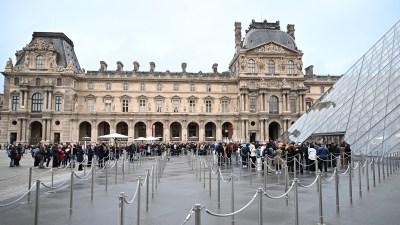Why London Stock Exchange has lost its numero uno position to Paris
Market participants feel that if the UK’s economy continues to struggle, the difference between the market caps of the exchanges will widen further.
 The London Stock Exchange Tower. (Source: Wikimedia Commons)
The London Stock Exchange Tower. (Source: Wikimedia Commons)London has lost its position as Europe’s biggest stock market to Paris, as concerns over the United Kingdom falling into recession weigh on British companies. This essentially means that market capitalization — or the value of all stocks listed — of the London Stock Exchange is lower than those listed on the Paris Stock Exchange.
How do the market caps of the two markets compare?
As per Bloomberg’s estimate, the combined market capitalization of shares listed on the London Stock Exchange, hitherto the leading exchange outside Wall Street, is now $2.821 trillion, while all shares listed on the Paris Stock Exchange are worth $2.83 trillion. For perspective, the BSE’s market capitalisation was Rs 284.32 lakh crore ($3.446 trillion) on November 16.
Market participants feel that if the UK’s economy continues to struggle, this difference, which looks marginal now, will widen further.
What happened in London for the stock exchange to lose its top position?
London lost its position as the most valuable European stock market as investors sold the stock of UK companies for fear that the economy was heading to a recession. Most economists define recession as two consecutive quarters of decline in a country’s real GDP.
The UK’s economic problems started after it decided to leave the European Union in 2016, but the COVID pandemic and Russia’s invasion of Ukraine increased the stress. The situation worsened after the country’s former Prime Minister Liz Truss announced a mini-budget in September, which led to turmoil in the market and rise in borrowing cost for the UK government.
Between July and September, the UK’s gross domestic product (GDP) contracted by 0.2 per cent, the latest data show. “The sentiment in the stock market is a reflection of what is happening to the economy,” said a market participant.
In November, the Bank of England’s Monetary Policy Committee (MPC) said “GDP is projected to continue to fall throughout 2023 and 2024 H1, as high energy prices and materially tighter financial conditions weigh on spending.” It increased the interest rate by 0.75 per cent to 3 per cent, the biggest jump since 1989, to check inflation. Data show that CPI rose by 11.1 per cent in October, up from 10.1 per cent in September.
But why does France continue to advance as the UK is faltering?
The UK is facing elevated inflation as energy prices soared following Russia’s invasion of Ukraine. The demand for fuel increased post COVID but war meant less supply, leading to higher prices. Higher food prices have also contributed to rise in inflation.
Analysts believe one of the reasons for France overtaking Britain is a bounce-back in demand for French luxury goods from Chinese shoppers. This has boosted shares of French luxury players. Latest reports indicate that the French economy is growing at a small pace, staving off a recession. The French central bank’s monthly poll showed activity advanced in October in both industry and services.





- 01
- 02
- 03
- 04
- 05

































